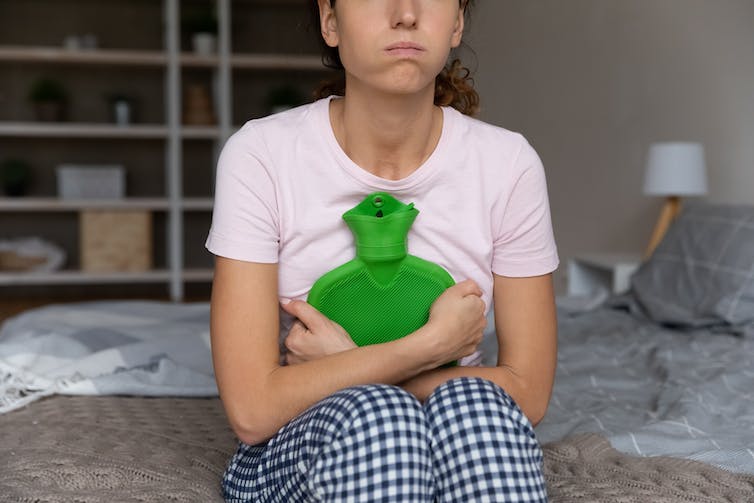
NFstock/Shutterstock
Spain recently adopted a menstrual leave policy, which makes additional (paid or unpaid) days off work available to “only and all cisgender women”.
It’s so great that we’re having more public conversations about menstrual and menopausal health, but I’m getting very tired of being told that menstrual leave is the solution.
As someone with a background in policy evaluation and the founder of the world’s first evidence-based menstrual health website, I am well placed to comment on this topic. When I evaluated existing menstrual leave policies around the world, I found that they were not progressive or beneficial for female reproductive health or gender equality.
The thing is, it is really hard to argue against something that sounds good, even if the available evidence suggests otherwise. Humans seem to be bad at going beyond surface thoughts and we may even prefer stories that align with rather than challenge gender stereotypes.
So, here is a quick outline of what I think you should know about this policy.
What is the problem?
There are four main arguments used by those promoting menstrual leave policy:
-
It will make the workplace fit for the menstruating female body.
-
It will improve menstrual health.
-
It will reduce menstrual shame and stigma, and associated discrimination.
-
It will improve gender equality in the workplace and beyond.
However, it has never been made clear exactly how the policy will deliver these outcomes. In fact, based on what we know about existing menstrual leave policies, it might not contribute to any of them.

This article is part of Quarter Life, a series about issues affecting those of us in our twenties and thirties. From the challenges of beginning a career and taking care of our mental health, to the excitement of starting a family, adopting a pet or just making friends as an adult. The articles in this series explore the questions and bring answers as we navigate this turbulent period of life._
You may be interested in:
Five important things you should have learned in sex ed – but probably didn’t
Postpartum exercise can have many benefits – here’s how to do it safely
Joy can help us be better at work – here’s how to find it
For instance, the policy does not make it easier to manage your period at work because your employer doesn’t have to change a thing. Instead, you are encouraged to stay away from the workplace.
The policy also does nothing to improve menstrual health. The 90% of people who menstruate and do not regularly experience severe symptoms do not need to take a whole day off work during their periods.
Meanwhile, the minority who do regularly experience severe symptoms almost always have an underlying health issue, such as endometriosis, heavy menstrual bleeding, polycystic ovary syndrome, fibroids, auto-immune disorders, depression or premenstrual dysphoric disorder. Encouraging people to cope with severe symptoms alone at home every month, is not an effective or humane solution.
These health conditions deserve effective and timely medical diagnosis and treatment, sick leave and reasonable workplace adjustments. The same things that apply to all chronic health conditions and are already covered by EU and UK labour policies.
Menstrual leave also does not help to reduce menstrual shame, stigma or discrimination. It actually encourages the removal of menstruation – and by extension women – from the public realm by hiding it at home.
This sex-based policy conflates healthy periods with debilitating menstrual health conditions, which both pathologises the normal female body and undermines health conditions that mainly affect women. This is partly why women and conditions that mainly affect women are more likely to be dismissed by doctors, sometimes taking years to get a formal diagnosis.
Finally, by medicalising the menstrual cycle (that is, positioning it as an illness rather than a healthy process) these policies reinforce sexist beliefs that make it seem like all women are biologically inferior (mentally and physically). This is a major contributing factor in gender discrimination, especially in the workplace, since these ideas are used to undermine the value, contribution and leadership potential of women.

Fizkes/Shutterstock
Menstrual leave might even make things worse
Not only have existing menstrual leave policies failed to address the problems they set out to solve, they have also directly resulted in discrimination against female workers. This is largely due to the gender myths reinforced by the policy. It makes all women seem like more expensive and less consistent and productive employees. It can also lead to a backlash from colleagues and employers against a sex-based benefit.
We already know that shared parental leave (for parents regardless of gender) is a more effective policy than maternity leave (which is female sex-based). It improves the gender pay gap, women’s hiring, promotion and leadership opportunities, child health outcomes, fatherhood experiences and gender equality in wider society.
These improvements occur because the policy avoids the gender-based backlash associated with maternity leave. This backlash is driven by the conscious or unconscious resentment of, and associated discrimination against, working women due to a perceived unfair advantage (paid time off work) and/or biological liability (the female reproductive body). The same issues apply to menstrual and menopausal health workplace policies.
We need to improve workplace (and school, and medical) knowledge of reproductive health and wellbeing. We should all know what’s normal or the sign of an underlying health condition. Likewise, it’s shocking that some people do not know why we menstruate or how to reduce cyclical changes.
We also need to make workplaces (including schools) fit for those who have periods and to promote more flexible and equitable work cultures and practices that benefit all employees. For instance, challenging “presenteeism” if employees feel obliged to work even when feeling unwell, and ditching “timed” toilet breaks.
While these actions are not quite as simple or catchy as “menstrual leave”, they would at least make a positive difference in the lives of millions of workers – without unintentionally worsening gender inequalities.
![]()
Sally King is the founder of Menstrual Matters. Her doctoral research was funded by the ESRC (Economic and Social Research Council). She is affiliated with the Women’s Equality Party and a board member of the Society for Menstrual Cycle Research.
























